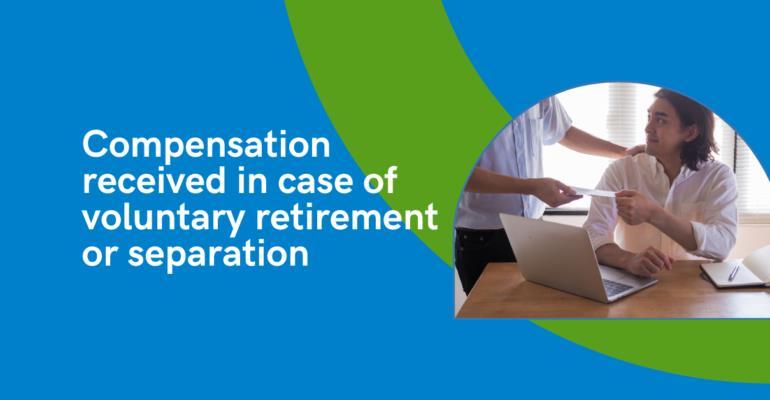Compensation received in the event of separation or voluntary retirement (Section

10(10C)
Introduction Where Compensation is received during retiring on a voluntary basis or in the event of separation, the amount received in compensation is exempt from taxation when all the conditions are fulfilled:
• Compensation is obligatory upon voluntary retirement or separation.
• Compensation is paid by an employee through the following activities:
An authority that is created by Central, State or Provincial Act; local authority;
1. university;
2. and Indian Institute of Technology;
3. The State Government;
4. The Central Government;
5. A notified institution that has significance in all of India or in any state (i.e. the International Crops Research Institute of semi-arid Tropics; Action for Food Production, New Delhi, Government Tool Room & Training Centre, Vijayanagar Industrial Estate, Bangalore);
Notified institute of management (i.e., Indian Institute of Management, Ahmadabad, Bangalore, Calcutta or Lucknow and the Indian Institute of Foreign Trade, New Delhi);
Public sector companies that is a public sector business
any co-operative or commercial society or co-operative.
• The maximum amount of exemption is Rs 5,00,000.
• If exemption was granted to an employee during any assessment year in accordance with section 10(10C) If so, no exemption from that section shall be granted to him in regard to another assessment year. So, exemption u/s 10(10C) is available only one time.
Prescribed Guidelines
There are certain guidelines to guide the intent in section 10(10C) that are set out in Regulation 2BA. The plan of retirement for voluntary retirees should be in line with the following rules, specifically the following:
• It only applies to employees who have completed the 10-year service or who have completed their 40th birthday (this requirement is however not applicable if the sum is paid in the course of the voluntary departure from a public sector business).
• it is applicable to all employees, employees and executives of a company, excluding directors of a business or co-operative society.
• the plan of the voluntary retirement or separation scheme is in place to reduce in the workforce's strength.
• the vacancy created by separation or voluntary retirement is in no way to fill and neither is the retiree is not eligible to work in an unrelated firm, or in any other business that is managed by the same company.
• the amount that is required to be paid as a result of the separation or voluntary retirement of the employee, do not exceed by the amount that is equivalent to 3 months' pay for each calendar year service or a monthly emolument amount upon retirement. This is multiplied by the remaining months of service remaining prior to the date of his retirement superannuation or whatever is greater.
Summary
This section explains that any amount received as compensation is exempt from tax under the Income Tax Act, 1961 this means that the amount will not be counted when taxing the income of an individual when the above-mentioned conditions are met.
